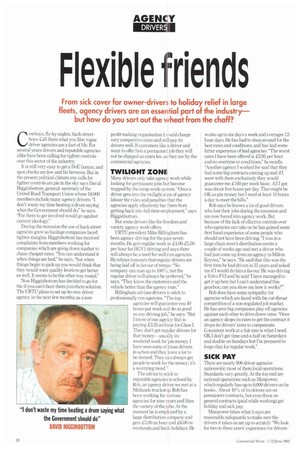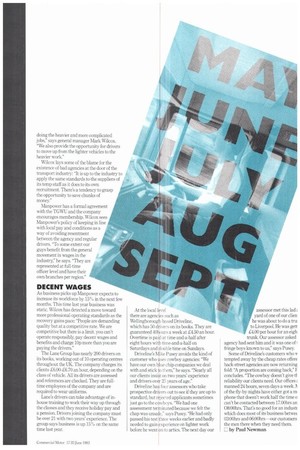Flexible friends
Page 30

Page 31

If you've noticed an error in this article please click here to report it so we can fix it.
From sick cover for owner-drivers to holiday relief in large fleets, agency drivers are an essential part of the industry— but how do you sort out the wheat from the chaff?
Cowboys, fly-by-nights, back-streetboys, Call them what you like; rogue driver agencies are a fact of life, For several years drivers and reputable agencies alike have been calling for tighter controls over this sector of the industry.
It is still very easy to get a DoE licence, and spot checks are few and far between. But in the present political climate any calls for tighter controls are pie in the sky says David Higginbottom, generalsecretary of the United Road Transport Union whose 18,000 members include many agency drivers: "I don't waste my time beating a drum saying what the Government should do," he says "For them to get involved would go against current ideology" During the recession the use of back street agencies grew as haulage companies faced tighter margins. Higginbottom has received complaints from members working for companies which are going down market to chase cheaper rates. "You can understand it when things are bad," he says, "but when things begin to pick up you would think that they would want quality levels to get better as well. It seems to be the other way round."
Now Higginbottom has decided to go for the if-you-can't-beat-them-join-them solution. The URTU plans to set up its own driver agency in the next few months; as a non
profit making organisation it could charge very competitive rates and still pay its drivers well. If customers like a driver and want to offer him a permanent job they will not be charged an extra fee, as they are by the commercial agencies.
TWILIGHT ZONE
Many drivers only take agency work while looking for permanent jobs but become trapped by the temp-work system. "Once a driver gets into the twilight zone of agency labour the rules and penalties that the agencies apply effectively bar them from getting back into full-time employment," says Higginbottom.
But some drivers like the freedom and variety agency work offers.
ORTU president Mike Bill i ngham has been agency driving for the past seven months. He gets regular work at £4.00-0.50 per hour for HGV I driving and says there will always be a need for well-run agencies. He refutes rumours that regular drivers are being laid off in favour of temps: "No company can man up to 100%, but the regular driver will always be preferred," he says. "They know the customers and the vehicle better than the agency man."
Billingham advises drivers to stick to professionally run agencies. "The top agencies will guarantee you 40 hours per week and its as good as any driving job," he says. "But I know of one agency that is paying £3.25 an hour for Class I. They don't get regular drivers for that money—usually its weekend work for pin money. I have seen some of those drivers in action and they leave a lot to be desired. They can always get people to work for the money; it's a worrying trend."
The advice to stick to reputable agencies is echoed by Rob, an agency driver we met at a Midlands truckstop. Rob has been working for various agencies for nine years and likes the variety of the jobs. At the moment he is employed by a large distribution company and gets £5.00 an hour and £6.00 on weekends and bank holidays. He works up to six days a week and averages 12hour days. He has had to shop around for the best rates and conditions, and has had some bitter experience of bad agencies: "The worst rates I have been offered is £3.95 per hour and no overtime or conditions," he recalls. "Another agency! worked for said that they had some big contracts coming up and if I went with them exclusively they would guarantee me 160 per week basic. All! got was about five hours per day That might be OK as pin money but! need at least 10 hours a day to meet the bills."
Rob says he knows a lot of good drivers who lost their jobs during the recession and are now forced into agency work. But because of the lack of effective controls over who agencies can take on he has gained some first hand experience of some people who should not have been driving. "I was in a large chain store's distribution centre a couple of weeks ago and met a driver who had just come up from an agency in Milton Keynes," he says. "He said that this was the first time he had driven in 15 years and asked me if would do him a favour, He was driving a Volvo F12 and he said 'I have managed to get it up here but I can't understand this gearbox; can you show me how it works?"
Bob does have some sympathy for agencies which are faced with the cut-throat competition of a non-regulated job market. He has seen big companies play off agencies against each other to drive down rates, "Once an agency drops its rates to get the contract it drops its drivers' rates to compensate. Consistent work at a fair rate is what I need. OK! don't get time-and-a-half on Saturdays and double on Sundays but I'm prepared to forgo that for regular work."
SICK PAY
There are nearly 900 driver agencies nationwide; most of them local operation& Standards vary greatly. At the top end are national operations such as Manpower, which regularly has up to 6,000 drivers on its books. About 40% of its drivere are on permanent contracts, but even those on general contracts (paid while working) get holiday and sick pay.
Manpower takes what it says are reasonable safeguards to make sure the drivers it takes on are up to scratch: "We look for two to three years' experience for drivers doing the heavier and more complicated jobs," says general manager Mark Wilcox. "We also provide the opportunity for drivers to move up from the lighter vehicles to the heavier work."
Wilcox lays some of the blame for the existence of bad agencies at the door of the transport industry: "It is up to the industry to apply the same standards to the suppliers of its temp staff as it does to its own recruitment. There's a tendency to grasp the opportunity to save chunks of money."
Manpower has a formal agreement with the TGWU and the company encourages membership. Wilcox sees Manpower's policy of keeping in line with local pay and conditions as a way of avoiding resentment between the agency and regular drivers. "To some extent our guys benefit from the general movement in wages in the industry," he says. "They are represented at full-time officer level and have their own branches per region."
DECENT WAGES
As business picks up Manpower expects to increase its workforce by 15% in the next few months. This time last year business was static. Wilcox has detected a move toward more professional operating standards as the recovery gains pace: "People are demanding quality but at a competitive rate. We are competitive but there is a limit, you can't operate responsibly pay decent wages and benefits and charge 10p more than you are paying the drivers."
The Lane Group has nearly 200 drivers on its books, working out of 10 operating centres throughout the UK. The company charges its clients £6.00-£6.70 an hour, depending on the class of vehicle. All its drivers are assessed and references are checked. They are fulltime employees of the company and are required to wear uniforms.
Lane's drivers can take advantage of inhouse training to work their way up through the classes and they receive holiday pay and a pension. Drivers joining the company must be over 21 with two years' experience. The group says business is up 15% on the same time last year. At the local level there are agencies such as Wellingborough-based Driveline, which has 50 drivers on its books. They are guaranteed 40hours a week at £4.50 an hour. Overtime is paid at time-and-a-half after eight hours with time-and-a-half on Saturdays and (II at ble time on Sundays.
Driveline's tike Pusey avoids the kind of customer who llses cowboy agencies: "We have our own ue-chip companies we deal with and stick o them," he says. "Nearly all our clients insi t on two years experience and drivers over 25 years of age."
Driveline has four assessors who take prospective drivers out to see if they are up to standard, but rejeced applicants sometimes just go to the cowboys. "We had one assessment terminated because we felt the chap was unsafe." says Pusey. "He had only passed his test three weeks earlier and badly needed to gain experience on lighter work before he went on to artics. The next day our assessor met this lad yard of one of our clien he was about to do a tru to Liverpool. He was gen £4.00 per hour for an eigh trunk. Our assessor asked agency had sent him and it was one of1 fringe boys known to us," says Pusey.
Some of Driveline's customers who v tempted away by the cheap rates offere back-street agencies are now returning fold: "A proportion are coming back," F concludes. "The cowboy doesn't give ti reliability our clients need. Our offices manned 24 hours, seven days a week. of the fly-by-nights have either got a m phone that doesn't work half the time o can't be contacted between 17.00hrs an 08:00hrs. That's no good for an industt which does most of its business betwee 03:00hrs and 06:00hrs—our customers the men there when they need them. G by Paul Newman
















































































